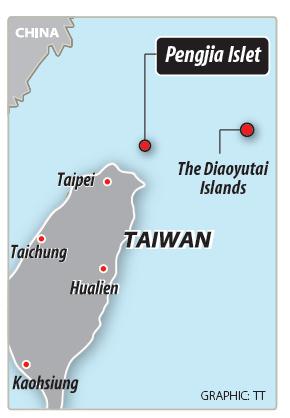The Presidential Office confirmed yesterday that President Ma Ying-jeou (馬英九) plans to visit Pengjia Islet (彭佳嶼) later this month.
Pengjia is situated just over 30 nautical miles (55km) north of Keelung and 76 nautical miles (141km) east of the Diaoyutai Islands (釣魚台). It is the closest Taiwan-held territory to the disputed island chain.
Presidential Office spokesman Fan Chiang Tai-chi (范姜泰基) said Ma has not inspected Pengjia since taking office, though he has visited many outlaying islands, including Green Island (綠島) and Lanyu (蘭嶼). Fan Chiang said the president planned to visit Pengjia this month to gain a better understanding of residents lives and demands.

“President Ma hopes to visit every town and outlaying island during his term and have direct communication with local residents. The Presidential Office has arranged the trip to Pengjia Islet because President Ma has never visited the island,” he said.
Fan Chiang declined to reveal details of the trip or comment on the speculation that the trip was aimed at asserting the nation’s sovereignty over the Diaoyutais.
Disputes over the sovereignty of the Diaoyutais continue to escalate as Japanese media recently reported that the Japanese government is planning to buy some of the islands in the chain, known as the Senkakus in Japan, for ¥2 billion (US$25 million).
The Ministry of Foreign Affairs (MOFA) has called for a peaceful and rational solution to the dispute in response to Japan’s move. Meanwhile, Ma has reiterated his proposed East China Sea peace initiative, while insisting that the government will not make any compromises in handling the nation’s sovereignty issues.
Ma will take a helicopter to Pengjia. In addition to visiting the islet’s weather station and inspecting the coast guard deployment, he is expected to hear a report on the current situation of the Diaoyutai Islands.
According to the Chinese-language China Times, the helicopter will fly to the air defense identification zone as a gesture to demonstrate the nation’s determination in defending the sovereignty of the Diaoyutai Islands.
The foreign ministry declined to say if there was any political connotation with sovereignty over the Diaoyutai Islands related to the trip.
Ministry spokesman Steve Hsia (夏季昌) said he did not think any country was in a position to comment on the trip because Pengjia is the Republic of China’s territory.
However, Democratic Progressive Party Chairman Su Tseng-chang (蘇貞昌) described the planned visit as “self-aggrandizing.”
“Ma should have come up with positive and aggressive measures which contribute to regional stability, national security and sovereignty in the past,” Su said in response to a media inquiry.
“To inspect an islet unrelated to the Diaoyutais when the controversy is a hot topic in the media is only a self-aggrandizing and negative move,” he said.
Additional reporting by Shih Hsiu-chuan and Chris Wang

PREPAREDNESS: Given the difficulty of importing ammunition during wartime, the Ministry of National Defense said it would prioritize ‘coproduction’ partnerships A newly formed unit of the Marine Corps tasked with land-based security operations has recently replaced its aging, domestically produced rifles with more advanced, US-made M4A1 rifles, a source said yesterday. The unnamed source familiar with the matter said the First Security Battalion of the Marine Corps’ Air Defense and Base Guard Group has replaced its older T65K2 rifles, which have been in service since the late 1980s, with the newly received M4A1s. The source did not say exactly when the upgrade took place or how many M4A1s were issued to the battalion. The confirmation came after Chinese-language media reported

A Ministry of Foreign Affairs official yesterday said that a delegation that visited China for an APEC meeting did not receive any kind of treatment that downgraded Taiwan’s sovereignty. Department of International Organizations Director-General Jonathan Sun (孫儉元) said that he and a group of ministry officials visited Shenzhen, China, to attend the APEC Informal Senior Officials’ Meeting last month. The trip went “smoothly and safely” for all Taiwanese delegates, as the Chinese side arranged the trip in accordance with long-standing practices, Sun said at the ministry’s weekly briefing. The Taiwanese group did not encounter any political suppression, he said. Sun made the remarks when

The Taiwanese passport ranked 33rd in a global listing of passports by convenience this month, rising three places from last month’s ranking, but matching its position in January last year. The Henley Passport Index, an international ranking of passports by the number of designations its holder can travel to without a visa, showed that the Taiwan passport enables holders to travel to 139 countries and territories without a visa. Singapore’s passport was ranked the most powerful with visa-free access to 192 destinations out of 227, according to the index published on Tuesday by UK-based migration investment consultancy firm Henley and Partners. Japan’s and

BROAD AGREEMENT: The two are nearing a trade deal to reduce Taiwan’s tariff to 15% and a commitment for TSMC to build five more fabs, a ‘New York Times’ report said Taiwan and the US have reached a broad consensus on a trade deal, the Executive Yuan’s Office of Trade Negotiations said yesterday, after a report said that Washington is set to reduce Taiwan’s tariff rate to 15 percent. The New York Times on Monday reported that the two nations are nearing a trade deal to reduce Taiwan’s tariff rate to 15 percent and commit Taiwan Semiconductor Manufacturing Co (TSMC, 台積電) to building at least five more facilities in the US. “The agreement, which has been under negotiation for months, is being legally scrubbed and could be announced this month,” the paper said,